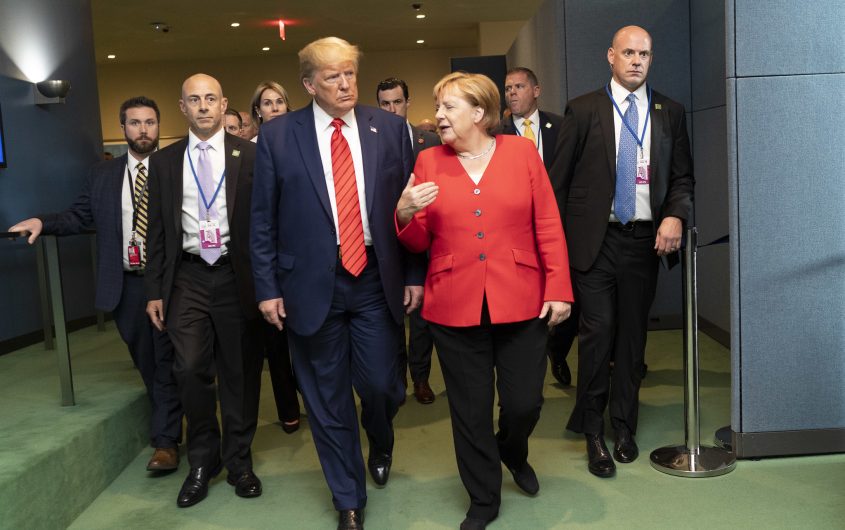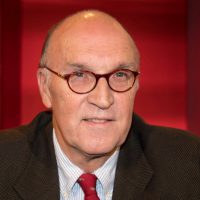
Official White House Photo by Shealah Craighead via Flickr
Must Germany Take on More Global Political Responsibility in the Corona Crisis?

Christian Hacke
Christian Hacke, born in 1943, is one of the most renowned political scientists in Germany. From 1980 to 2000 Hacke was a Professor at the University of the German Armed Forces, now Helmut Schmidt University, in Hamburg. From 2000 to 2008 he succeeded Hans-Peter Schwarz and Karl Dietrich Bracher as a Professor at the University of Bonn.
Image: © Superbass / CC-BY-SA-4.0
History shows that it is always outstanding personalities who shape events. For better or worse, they influence the dynamics and direction of events. This is also true now in view of the coronavirus pandemic and the associated global political dynamics—especially in view of the dangerous confrontation between the United States and China. Given how long both world powers have been hopelessly entangled in each other like two boxers in close combat, they can only be separated from each other with outside assistance.
Hardly any other person seems so predestined for crisis management in the matters of the coronavirus and for an attempt at mediation between the U.S. and the People’s Republic of China as Chancellor Angela Merkel.
In Beijing, the chancellor is held in high regard. The problem is the United States. Trump’s irritating foreign policy, his fake diplomacy, and his grandiloquent “America First” approach exacerbate the problems of international politics. But who knows, perhaps the unpredictability and volatility of his policy could also turn out to be an opportunity. In this tension-filled crisis, America should play a trump card that China has still failed to play: be a reliable partner, especially in Europe. One should not do without the advice of friends, especially in times of crisis in Washington.
In this tension-filled crisis, America should play a trump card that China has still failed to play: be a reliable partner, especially in Europe.
A Chancellor Kohl would probably already have come to the White House of his own initiative. With rustic charm, he would try to convince President Trump that he would now gain prestige at home and internationally if he refrained from irritating Beijing. Maybe he wouldn’t go to the sauna with Trump, but he would seek ways and means to develop a “friendship between men” with Trump. Kohl would make it clear to Trump that he would gain prestige in the corona crisis with Chinese help. This would also re-stimulate the U.S. economy. Helmut Kohl would also know how to make use of Trump’s vanity. He would appeal to Trump’s official political responsibility and to his historic role in this crisis. And Kohl would perhaps cleverly suggest that, in the event that Trump showed open-mindedness toward Xi in Germany and among his European friends, EU help for the U.S. would be promised. Would Chancellor Kohl perhaps have already landed in Washington, DC, with a Luftwaffe plane packed full of medical supplies to reaffirm Germany’s solidarity with corona-shaken America?
A Chancellor Schmidt would probably have used this crisis for more international activity. With his keen sensitivity for handling authoritarian heads of state in Beijing, Schmidt would have appealed to Chinese greatness and encouraged them to renounce any triumphalism toward the U.S.
Last but not least, it should be remembered that fifty years ago, Chancellor Willy Brandt defused the Cold War between the U.S. and the Soviet Union with his policy of détente. Germany could take up this tradition now to avert the threat of a Cold War between the U.S. and China.
Germany can therefore, as courageous German chancellors have shown, pursue constructive foreign policy on an equal footing with other world powers.
Angela Merkel has long since proved that she too knows how to overcome serious crises.
Angela Merkel has long since proved that she too knows how to overcome serious crises. Now would therefore be a good time to recall the détente policy legacy of her predecessors. She could go to Beijing and Washington for confidential talks. Or she could suggest that the UN, the G-2, the G-7, or the G-20 crisis policy be activated; a corona conference, autonomous or under the umbrella of the UN, would also be conceivable.
Incidentally, détente policy initiatives are in the very best interests of the Europeans, since both powers are considerably increasing their conflict-laden influence on Europe. The U.S. is blatantly pushing the EU on its side and into an anti-Chinese position. China is also exerting pressure, but with greater agility. It is precisely through its aid to Italy and other European states that China is making an impression!
Both world powers are thus pulling Europe in opposite directions. Europe, already deeply fissured and divided, is threatened with a further test of endurance if the American-Chinese power rivalry continues to spread across the continent. Europe therefore has an existential self-interest in a “strategic pause” and, even more so, in a sustained easing of tension between the two world powers. Otherwise Europe is in danger of being “sandwiched in” by both powers; relaxation of tensions is thus an indispensable prerequisite for Europe’s unity and economic prosperity.
In a few weeks, Germany will take over the rotating presidency of the Council of the European Union. In this role, the chancellor can emphatically represent European interests vis-à-vis the two world powers. She will step into the ring with “European legitimacy,” so to speak.
Whoever takes the initiative, courageous action is needed to ensure peace and prosperity. The continuation of globalization is not at stake. It remains the hallmark of world politics in the twenty-first century. But globalization “made in China” would have serious consequences for freedom, individuality, and human rights.
The American loss of power under the leadership of President Trump is a current problem. But in the long term, China’s authoritarian success model could develop into a global political challenge. In view of the American leadership weakness, America’s partners must step up their efforts in this new competition. The corona crisis is also about the self-assertion of the liberal world. This is why courageous initiatives from Europe are needed. As a central European power, Germany could set a good example.
Translated from German by Caroline West.








